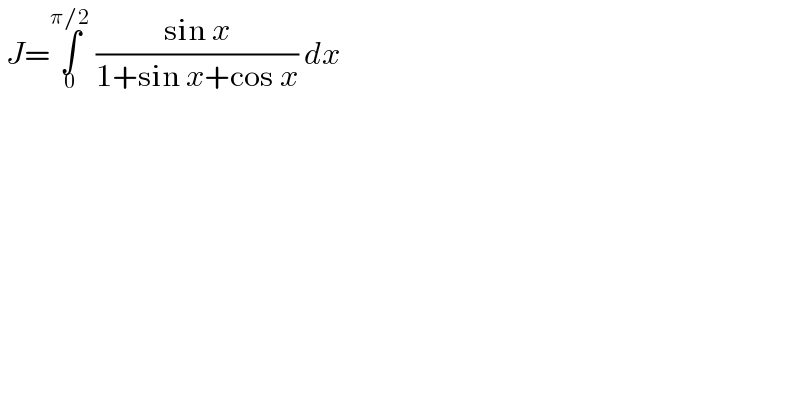
Question and Answers Forum
Question Number 175387 by cortano1 last updated on 29/Aug/22

Commented by infinityaction last updated on 29/Aug/22
![J = ∫_0 ^(π/2) ((2sin(x/2)cos (x/2) )/(2sin(x/2) cos(x/2) +2cos^2 (x/2) ))dx J = (1/2)∫_0 ^(π/2 ) (((sin(x/2)+cos(x/2)) −(cos(x/2)− sin(x/2)) )/(sin(x/2) +cos(x/2) ))dx J = (1/2)∫_0 ^(π/2) dx −(1/2)∫_0 ^(π/2) ((cos(x/2)−sin(x/2) )/(sin(x/2)+cos(x/2) ))dx J = (π/4) − [log(sin(x/2) + cos(x/2))]_0 ^(π/2) J = (π/4) − log((√2))](Q175391.png)
Answered by som(math1967) last updated on 29/Aug/22
![2J=∫_0 ^(π/2) dx −∫_0 ^(π/2) (dx/(1+sinx+cosx)) 2J=∫_0 ^(π/2) dx−∫_0 ^(π/2) (dx/(1+2sin(x/2)cos(x/2)+1−2sin^2 (x/2))) 2J= x−∫_0 ^(π/2) ((sec^2 (x/2)dx)/(2sec^2 (x/2)+2tan(x/2)−2tan^2 (x/2))) 2J=x−∫_0 ^(π/2) ((sec^2 (x/2)dx)/(2(1+tan(x/2)))) 2J=[x+ln(1+tan(x/2))]_0 ^(π/2) 2J=(π/2) −ln2 J=(π/4) −ln(√2)](Q175389.png)
Commented by cortano1 last updated on 29/Aug/22

Answered by Ramanathan last updated on 29/Aug/22

